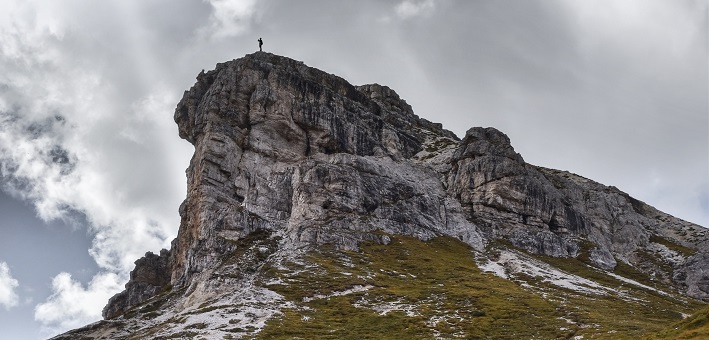Commentary on Luke 9:28-36 [37-43a]
Coming at the end of the Epiphany season, this passage from Luke not only provides insights to the invited apostolic trio, but specifically invites us readers/hearers in to share the excitement. “Behold” (verse 30) is lost in the NRSV translation, but still appears in the NKJV. “Hey, look,” (idou) is the word to direct our attention away from the gleaming face and garb of Jesus only to include a larger scene where Moses and Elijah were also appearing in glory. Luke has a way of shifting focus from a particular event to God’s larger work and purposes. (Note Mary’s song, Simeon’s song, and Jesus’ words in Nazareth in Luke 4).
The scene will shift back to Jesus only at the end (verse 36), just at the point where Peter, James, and John, having seen Jesus in the larger setting, are enjoined by him to silence about the whole of it. At the point where it comes in the narrative, this story is clearly for Peter, James, and John and for the readers/hearers who are invited into the inner circle. It may also be for Jesus himself.
The passage is so rich in detail and allusion that I refer you to any commentary, including commentaries in Working Preacher, for great work on significant details that highlight many possible preaching themes. In this short essay, we’ll look at the narrative context of this scene and then at a few points unique to or especially salient within Luke’s version that gives particular opportunities in Year C.
One of the noteworthy aspects of verses 28-36 is that they are embedded in prayer. Proseuchesthai shows up twice (verses 28, 29) right at the beginning. In the very moment that Jesus is praying, the appearance of both his face and clothing changes. Luke frequently centers epiphanies of Jesus’ connection with God in prayer. Note 3:21; 5:16; 6:12; 9:18, for examples up to this point. Prayer, communion with God, is very often associated with the coming of the Holy Spirit in Jesus’ life, beginning with baptism. It is the presence of God’s Holy Spirit that empowers Jesus for healing, for the calling of the Twelve, for enduring the temptations, and for speaking truth.
That same brilliant spirit of God shines on and in Jesus and Moses and Elijah as they gather to speak of Jesus’ coming exodus (verse 31). All of Scripture (The Law and the Prophets, Moses and Elijah respectively) is enlisted as pointing to the future passage through death to glory of God’s anointed one. God’s own faithfulness is borne out in the trustworthiness of Scripture (Luke 24:27), witnessing as it does to the suffering of the Messiah that precedes his glory.
Another important aspect of Luke’s story is the number of terms having to do with looking and seeing (or the opposite). Eyewitnesses were vital to the handing on of Jesus’ story in a reliable way (see also Luke 1:2; Acts 1:21-22). Because “glory” is a visible aspect of God’s holiness and majesty, eyewitnesses were vital to handing on this experience of Jesus’ tangible glory, a glory puzzling and yet hope-giving. The passage turns on seeing the appearance of Jesus’ face, the gleaming clothing, the call to “behold,” the appearance of Moses and Elijah, the “seeing” of Jesus’ glory and the two men (verse 32), the visible cloud which once protected Israel from the sight of God or from the sound of God’s voice (Exodus 20: 18-21, 24:15-18, 34:29-35) and now shielded Peter, James, and John from seeing God. This is a passage where seeing is very important but needs the support of God’s voice to bring even limited understanding to the three followers. It might be noted that human voices, even as Peter, for example, tries to interpret what is happening before his eyes according to Scripture, are not able to articulate what has happened. When the men come down the mountain, they keep silent, telling no one what they had seen.
Exodus
Since we are also invited to see, we are left trying to articulate all that the vision includes. There is no way to do that without reference to the word “exodus” in verse 31. While sometimes translated as “departure,” this word which occurs nowhere else in the gospels is too rich in nuance to simplify. Only Luke gives the content of Jesus’ conversation with Moses and Elijah, highlighting the importance of that conversation about exodus and offering a unique opportunity to the preacher to make the connections for her audience. Like Moses before him, Jesus is given an experience of God and God’s majesty. Like Moses, in spite of being chosen, he is not granted easy passage. The word exodus is a reminder of plagues, blood, the death of first-born sons, and the unremitting recalcitrance of the oppressive power of the Egyptians.
The connections with Exodus (and with Elijah) remind hearers/readers that God will deliver God’s people from slavery as often as God must do it. An exodus from under the power of any oppressor has a cost. Jesus must “set his face like a flint” to get to Jerusalem (9:51). The three disciples who will follow that road with him have seen the glory that awaits and find the path to Golgotha deeply confusing. Jesus’ exodus will deliver even from the power of death, not just death-dealing powers-that-be, but death itself. That cannot be clear to Peter, James, and John until it has been accomplished.
The reactions of disciples in this story are worth attending to. It is only in Luke’s story that the three are “heavy with sleep.” There is debate about whether they succumb to it and awaken in time to “see his glory” or whether they remain awake. The participle is an aorist form and can be translated either way. Let the preacher make a choice! Whatever you choose, their eyes are open in time to see the whole scene and to do their best to grasp it.
One more word: although Peter, James, and John have this awe-some experience, the other nine follow Jesus on his exodus journey without that experience. We are probably, most of us, more like the nine who go along anyway, except that now the experience of hope beyond the difficulties of our journeys is also given to us.


February 27, 2022